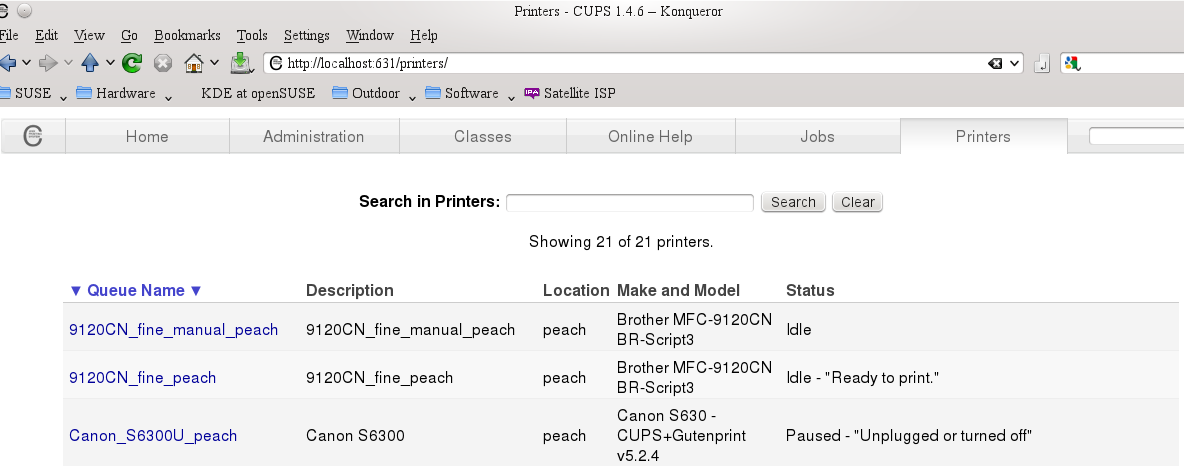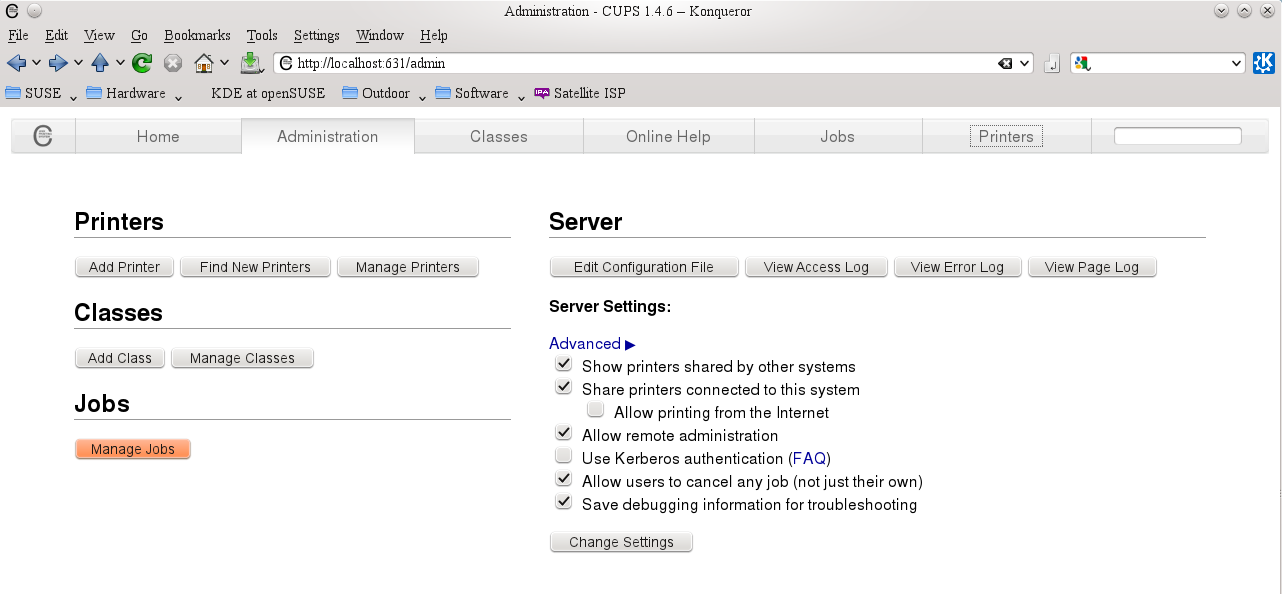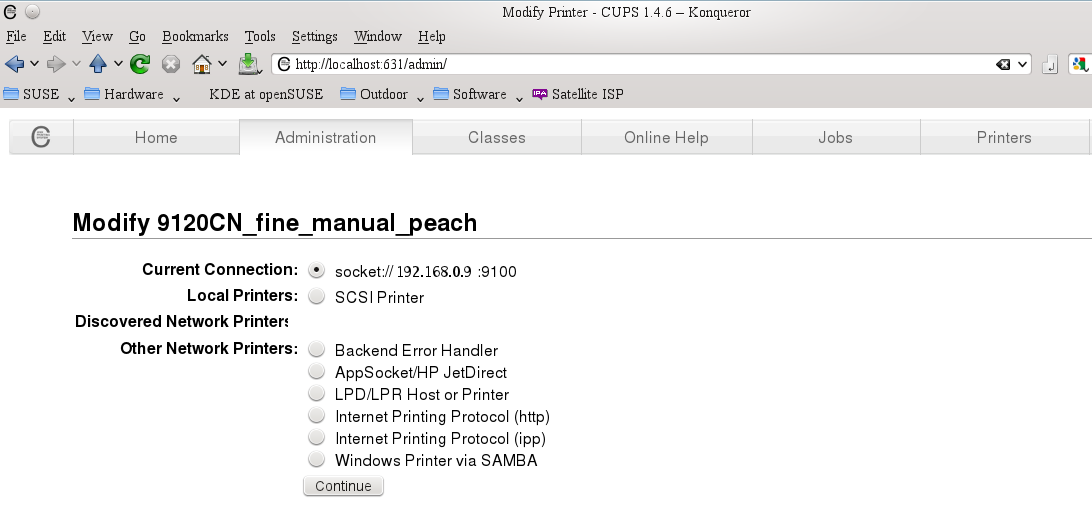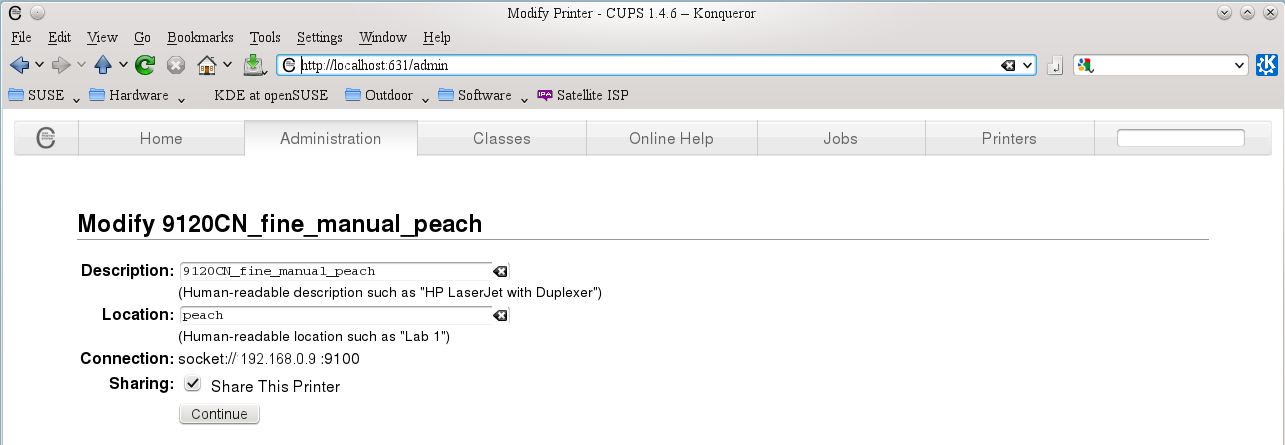Sharing Printers via CUPS
Overview
CUPS is a newer printing sub-system, that has inbuilt support for network printing. Its use can enable printing over a LAN to be achieved relatively simply, often requiring:
- no additional installation of software or "drivers"
- only simple configuration changes
One feature of CUPS which can frequently be useful is its ability to print to a network/shared printer when the computer from which the print job is created has no relevant printer drivers installed. Three examples:
- a laptop/netbook/tablet computer being used away from its home location
- an OS for which a suitable printer driver can't be obtained eg Windows 7, 64 bit Windows
- a computer where the administrator password (which may be required to install drivers) is unknown.
CUPS is now the default print sub-system in most Operating Systems - Android, ChromeOS, MacOS, Linux and BSD.
Consequently, it is widely deployed on many devices, such as Smartphones, Tablets, Media Centres & Macintoshes, as well as emerging "pocket computers" and might/could be on other Net/Notebooks, Laptops amd Desktop computers.
Limitations with Windows OS
Windows does not have CUPS
- simplest alternative for network printing is described at Printing via Network
- although other work-arounds are available, these are the province of intermediate/advanced users and probably only worth pursuing in the following mid/long term scenarios:
- routine printing from a Windows version for which a particular printer "driver" is not available
- minimising maintenance of a mixed OS LAN
An overview of the techniques that are feasible for Windows and guides to implmenting those is available from:
http://en.opensuse.org/SDB:Printing_from_Windows_to_Linux
A lower tech solution for small LAN, having Windows as well as other OS, is long "USB" cables
- the limit of length to 5 metres for USB cables can be overcome by using a pair of USB-Ethernet/RJ45 converters, which enable a USB printer to be accessed from up to 100 metres over Cat 5 cabling.
- sets of these converters are available from specialisist computer hardware suppliers
- might variously be described as "printer extenders" "USB extenders" etc
- although this is not network printing, it can suffice.
Windows 7
This section requires input from an experienced Windows 7 user
- CUPS, per se, is not apparently available
- the underlying protocol IPP is available, (but not necessarily installled) for editions other than "Starter"
- it prints via the Internet, which may not meet a user's security requirements
Windows XP
- requires 3rd party software, which wont be installed by default
- installing CUPS on Windows XP is complicated
- when installed, it can work only with Postscript capable printers (this excludes most ink-jets and many low cost laser printers)
- this limitation may also apply to Windows 7
Mac OS
Apple's implementation of CUPS includes some proprietary extensions. That is unlikely to effect Mac to Mac printing but may introduce limitations in printing between Mac OS and other Unix like OS.
Situation
This guide assumes that CUPS is installed and generally functioning on both computers. The screen shots are from CUPS version 1.4.x/1.5.x. Versions 1.3.x provide the functionality required but have different menus.
Prerequisites
Definitions
- "client computer" means the computer/device from which the print job will be generated
- it must have CUPS client installed, which is the default condition for Max OSX and Linux
- it need not have any printer drivers installed
- indeed, it is less confusing if it does not
- "server computer" means the computer controlling the printer. It can be:
- for network printers, which are connected directly to a network, any computer on the network, having the relevant CUPS print drivers installed
- network may be wired, WiFi or bluetooth
- it is perfectly acceptable to configure several computers to use a particular network printer
- for USB/parallel attached printers, the computer to which the printer is attached
- it must have CUPS server installed, which is the default condition for Max OSX and Linux
- the relevant printer must appear in its "Printers" list, and be working
- the computet must be posered on, to enable printing, although logon won't usually be required .
CUPS Versioning Issues
Devices sold by Apple Inc can deploy proprietary extensions to CUPS. Consequently, some features may not work as expected, if the print job is sent to a printer that is controlled by another version of CUPS
As a general rule, the print server should have a version not earlier than the client Version 1.5 of CUPS is likely to produce a print job as a PDF file, whereas version 1.3 & 1.4 servers accept only PostScript files
- check in the Home tab of CUPS for version number
Configuration
CUPS is configured via a web browser. Its URL on the local computer is:
Windows might not implement the short-cut "localhost". If not, then substitute the real IP address of the PC. Execute "IPCONFIG" from a Windows command line to find this address.
From the server computer, in the CUPS "administration" tab, ensure that "Share printers connected to this system" is checked:
then click "Change Settings" button to save any changes, if necessary
Then click on the "Manage Printers" button in the same tab, select the relevant printer and pull down the "Administration" menu
- select "modify printer" then click the "continue" button to proceed to its second screen
- ensure that "share this printer" is checked
- it will be helpful to make the "Location" the name of the computer controlling this printer
- click "continue" until the process completes
From the client computer, in the CUPS "administration" tab, ensure that "Show printers shared by other systems" is checked
then click "Change Settings" button to save any changes, if necessary
Quicktest
Both computers must be connecting to the local LAN via wired or wireless interface. A quick test is to start a web browser and check that the Internet is accessible. Provided that network access is working:
- Start a text editor (kate, leafpad etc)
- if the application is already running then it may need to be shutdown and restarted to recognize newly available printers
- Open a new document and type a few words
- From the file menu, select "Print"
- Select the relevant printer from the drop-down dialog
- which should list all shared printers on the LAN
- click on the properties/settings button
- ensure that the key settings are suitable eg A4 paper size, portrait orientation
- click OK/print
Preliminary Troubleshooting
1. No printers listed in the print dialog
This problem frequently is the result of a firewall running on one or both computers. Network printing can work only if either:
- firewalls on each computer allow port 631 through or
- Ethernet zones are set as "trusted/internal" in the firewalls on each computer
Only printers powered up will appear in the list
- confirm that the relevant printer is powered on
- if it is attached to another PC via parallel or USB cable then that PC must also be powered on
- (it is not necessary to log in to the sharing PC)
2. Print Job accepted but no output on Printer
This can be a result of many possible causes. Some simple checks:
- is CUPS known to be installed and working on the computer from which the text was created ?.
- Can it print to some printer at its home base ?
- does a similar print job created on the server computer give output on the printer ?
3. Print Job rejected by Server
- possible permissions issue - check that:
- printer is set as "share this printer" on the server
- follow "modify this printer" dialog
- printer is set as "share this printer" on the server
- possibly incompatible CUPS verions
- as a general rule, the print server should have a version not earlier than the client
- version 1.5 clients produce jobs as PDF files, that are likely to be rejected by 1.3/1.4 servers, which expect PostScript files
- preferably upgrade the complete CUPS system on the server to version 1.5
- a new version of the driver for each printer is required at the server end, to support PDF print jobs
- if a binary driver, from the manufacturer, was previously used, check whether a driver is now included in CUPS or, failing that, whether an updated driver can be obtained from the manufacturer
- following the upgrade, follow the "modify this printer" dialog for each printer and select the most recent PPD file.
If all else fails, then the CUPS Administration page has a button "View Error Log". Text towards the end of that file may give some clues.
---[[-Rpeters 18:02, 18 August 2012 (EST)]] --



